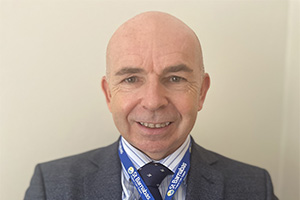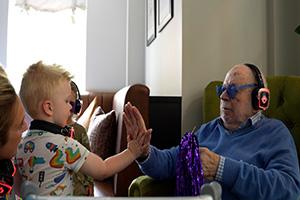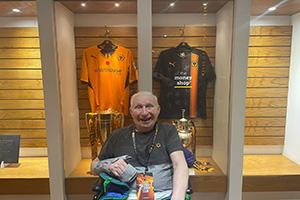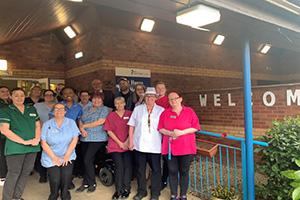“On the Admiral Nurse Helpline, we never judge - it’s open access for anyone living with dementia or supporting people with dementia.”

58-year-old Mark Challinor works as an Admiral Nurse at Dementia UK on the national Admiral Nurse Helpline. Dementia UK is the only charity that provides Admiral Nurses who are specialist dementia nurses.
Mark completed his Registered Mental Health training in 1989 at Lincoln. Having worked for seven years in Scunthorpe in older people’s services in inpatient and community services, he moved back to Lincolnshire initially as a community psychiatric nurse.
This created a platform for Mark to take up a variety of older people leadership/management roles over a 24-year period managing inpatient, community, and mental health liaison services across Lincolnshire.
Throughout this time, Mark undertook several complementary roles that included CQC Specialist Advisor, University Practitioner/Lecturer, and an additional role as a Best Interest Assessor.
At the age of 55, Mark left the NHS in 2019 with a yearning to return to front-line clinical services.
“Whilst I had heard about Admiral Nursing when I was working in the NHS, I didn’t really understand or know the role they played in supporting families with dementia.”
A new countywide Admiral Nurse community for Lincolnshire hosted by St Barnabas Hospice was piloted in June 2019 where he mainly visited families in their own homes.
Whilst the local communities and the commissioners were supportive of the pilot, the service was redesigned in 2022 and Mark saw this as an opportunity to strengthen his skill set working for Dementia UK on the national Admiral Nurse Helpline.
Mark started as the only substantive male member of staff on the helpline in February 2022 and can say without hesitation that “it’s the best job and organisation that I have worked for.”
“Although home based you never get the sense that you are working alone. No two days are ever the same and whilst the helpline is extremely busy, you always work with supportive and passionate colleagues that share similar aspirations and skills.
“This internal network creates a supportive culture so that you can draw on this wealth of experience and knowledge whenever you are faced with a particular challenge or question. When juxtaposed with a continual focus on personal development and personal well-being, it is easy to understand why this ‘recipe’ is successful and probably explains why retention rates remain high for Admiral Nurses. Although a cliché, ‘happy staff equates to happy customers.”
For Mark, it’s also about positive connections.
“Some people, especially older people just want to chat. I love making a difference, and giving people hope and inspiration. Having a skill set within dementia care allows me to provide ideas, coping strategies, and understand their needs to manage and embrace dementia on a day-to-day basis both during the day and at night.
Whilst dementia is sometimes portrayed negatively by the media you never sense this when you are supporting families.
“I’ve found the positive thoughts and comments received from individuals and families who I’ve supported to be overwhelming.
“People who call us on the helpline can be very distressed, especially when memory problems are evident, after a diagnosis, or when they are trying to support the person with dementia.
“Many callers disclose their frustrations about the current health care system, their feelings about injustice and funding, and continual issues with trying to navigate through health and social care systems.
“For many calls you provide encouragement, validate their feelings, and acknowledge strategies, tweaking an approach or providing them with a script that they can use to enable further help. Many callers ring in to check with us that they are doing ‘the right thing’ and are ‘on the right track.’
“We often receive calls from younger people who are worried about problems with their memory or something they have seen in the news.
“On the Admiral Nurse Helpline, we never judge - it’s open access for anyone living with dementia or supporting people with dementia. This can include those people with dementia, their families, or friends as well as professionals seeking additional help.
“Although many of the callers are of a sensitive nature, many families also want to talk about amusing anecdotes or stories and particular strategies that they have adopted that we can always share with others.
“We often lose sight of the fact that supporting somebody with dementia can create new experiences and opportunities, gathering insights that carers find amusing and want to share with us.”
Mark often finds himself laughing with the callers as they find this a welcome release of emotion that can be cathartic.
A typical day for Mark
Mark works substantively three days a week on Tuesday, Wednesday, and Thursday.
Generally, he logs on around 8.45am and the team are led daily by a shift coordinator. From Monday - Friday there are between 10-16 Admiral Nurses on a shift from 9am-5pm and from 6pm-9pm and on weekends, there are 3-5 nurses.
The Admiral Nurses are assigned one of two specific roles; a triage team that works through previous requests and emails from callers or alternately a team dedicated to take live calls from callers as they ring in.
These roles, including the shift coordinator, alternate so that they always have opportunities to change roles as demand dictates.
He starts taking calls at 9am which can vary, depending on the clinical situation described on the call. Some calls may be short in relation to signposting and offering advice and others may be complex, averaging around 30-60 minutes.
“In between calls, we’re also encouraged to take a break to reflect and where needed debrief. Every shift always has a senior lead nurse who can provide additional support in situations like safeguarding.
“I document calls after speaking to a family. On a call, we can access an extensive database of information and we also have a map to help us access where the Admiral Nurse teams are across the UK.
“I have 30 minutes for lunch and stop taking calls at 4.30pm. I then have 30 minutes to complete the final call and check out and then debrief again with colleagues.”
Nursing is often perceived to be a female-dominated career pathway. For Mark, he feels there are advantages to being a male nurse on the Admiral Nurse Helpline.
“Callers are sometimes surprised when they hear my voice on the helpline. Some callers do prefer female nurses especially when their call is related to domestic violence or sexual exploitation for example.
“However, we are taking many more calls from male carers who are supporting their spouses or friends with dementia. They appreciate the opportunity to talk about ‘bloke things’ and their own emotions, which serves as an icebreaker. Because there’s an affiliation, you can then encourage openness and transparency.
“As more male Admiral Nurses are now joining the helpline, this has created further opportunities to give callers a choice where needed. However, we still need more male Admiral Nurses to help families affected by dementia.”
Mark’s advice for anyone considering Admiral Nursing as a career is ‘to go for it now, you will have no regrets.’
“You’re able to utilise your skills and work in a supportive organisation that encourages personal growth and development. Most importantly, you will feel a real sense that you can make a difference to the lives of families with dementia.”
Dementia is a huge and growing health crisis; the estimated number of people with the condition in the UK is 944,000. This number is set to increase to 1.1m by 2030.
For families affected by dementia, Admiral Nurses can help families to manage complex needs. But there aren’t enough Admiral Nurses to reach every family that needs support.
With gaps in health and social care services, Admiral Nurses are uniquely placed to provide life-changing guidance and inspire change within the dementia care system, as it recovers from the COVID-19 pandemic. By converting your role to an Admiral Nurse post/becoming an Admiral Nurse, you can offer a lifeline to families when they need it most.
To find out more about becoming an Admiral Nurse, speak to the team at Dementia UK by emailing admiralnurserecruitment@dementiauk.org





